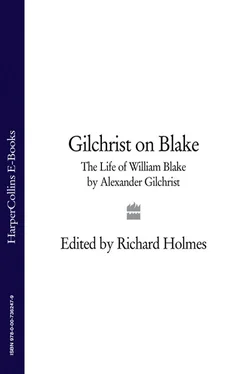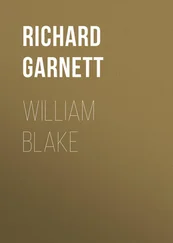Indeed overall, the changes in the second edition had a curiously muffling effect. The dramatic story of Blake’s Sussex period nearly doubled in length, but also halved in biographical impact. The picture of Blake’s strange inner life, was swamped and blurred by the mundane superfluity of Hayley materials. The fifty extra pages slowed the pace of the entire narrative.
This loss of pace was further increased by newly extended citations from the Prophetic Books. Though she still regarded any attempt to interpret Blake’s mythology as ‘a reckless adventure’, Anne hopefully read and re-read Jerusalem , finding ‘several more coherent and indeed beautiful passages’, and relating the poetry to the ‘sublime influence of the sea’ on Blake at Felpham. Finally she added half-a-dozen new extracts from both Jerusalem and Milton to Chapter 21, with a brief commentary on Blake’s use of names. She also referred the reader to Swinburne’s critical essay, as a possible guide ‘through the dark mazes of these labyrinthine, spectre-haunted books’. Further expansions included more quotations from the ‘Proverbs of Hell’, and further brief reflections on Blake’s mysticism.
But she also made cuts at certain points of controversy. She slightly shortened the Adam and Eve’ incident in Chapter 12, in deference to its supposed immorality. She also removed some of Alexander’s reflection on the sexual symbolism of The Daughters of Albion’, the old point of disagreement with Macmillan and ‘flustered Propriety’. Finally she censored a few of his more vivid but risqué phrases, such as the memorable reference to the music hall nude shows near Fountain Court.
Altogether the addition of the new letters, together with Anne’s expanded quotations from the Prophetic Books, and her prudential cuts, gave the second edition of 1880 greater authority as a work of reference. But it also damaged much of its original charm and energy as a biography.
The second edition was longer, slower and more ponderous. The elegant, lively narrative structure with its short concentrated chapters, as Alexander had originally devised it, was weakened and made more conventional. It lost something of the passionate excitement and directness of its original youthful conception. Ironically for all Anne’s sense of holding a sacred trust to her husband’s work, Alexander’s own voice is muted and dissipated. The second edition became more like a standard high Victorian volume of Life and Letters.
Nonetheless, the edition of 1880 continued the task of reestablishing Blake’s reputation on both sides of the Atlantic. Praise for Gilchrist’s heroic work was now universal, and Walt Whitman for one, saluted the rise of a new informal English style of biography, comparing it to the work of J.A. Froude. The Blake book is charming for the same reason that we find Froude’s Carlyle fascinating – it is minute, it presents the man as he was, it gathers together little things ordinarily forgotten; portrays the man as he walked, talked, worked, in his simple capacity as a human being. It is just in such touches – such significant details – that the profounder, conclusive, art of biographical narrative lies.’
Anne would still make no claims other than that of being ‘editor’ of Alexander’s work. Instead she added a long and passionate Memoir, praising his supreme dedication as a biographer. In it she made this thoughtful observation: ‘If I could briefly sketch a faithful portrait of Blake’s biographer, the attempt would need no apology, for if the work be of interest, so is the worker. A biographer necessarily offers himself as the mirror in which his hero is reflected; and we judge all the better of the truth and adequacy of the image by a closer acquaintance with the medium through which it comes to us.’ In the use of that one word ‘medium’, she might, at least unconsciously, have been calling attention to herself.
Anne Gilchrist later wrote the Blake entry for Leslie Stephen’s Dictionary of National Biography in 1882, and also a well-judged Life of Mary Lamb for the new and influential Eminent Women of Letters series, published by Allen Lane in 1883. She had other literary plans, including Lives of Wordsworth and Thomas Carlyle. But her heart was broken by the sudden and tragic death of her favourite daughter Beatrice.
This was the child they had nursed through scarlet fever at Cheyne Row, while Alexander was struggling to complete the biography. She was always closely associated in Anne’s mind with the early shared work on Blake. True to her mother’s early leanings towards science, Beatrice had been training in Edinburgh to qualify as one of Britain’s first women doctors. Possibly as the result of an unhappy love affair, she committed suicide at the age of twenty-five by taking cyanide in July 1881. Anne Gilchrist never really recovered from the death of Beatrice, so shortly after the publication of the second edition of Blake. She contracted cancer and died at Hampstead four years later in November 1885, aged only fifty-three, all her other literary plans unfulfilled.
Gilchrist’s original Life of William Blake , with its combative subtitle Pictor Ignotus (The Unknown Painter’), is one of the most influential of all the great mid-Victorian biographies. It rescued its subject from almost total obscurity, challenged the notion of Blake’s madness, and first defined his genius as both an artist and visionary poet combined. It set the agenda for modern Blake studies, and remains the prime source for all modern Blake biographies. It remains wonderfully readable today, and salvaged from death, it still vibrates with extraordinary life.
Yet like so many works of art, it was produced at great cost, and under mysterious conditions. In the absence of an original manuscript of the 1863 biography, the mystery will always remain just how much of this first, ground-breaking text we really owe to Alexander Gilchrist or to Anne; or to some indefinable Blakean collaboration between the two.
The text printed here is that of the first edition of 1863, together with the letters to Thomas Butts in an Appendix.
From nearly all collections or beauties of The English Poets,’ catholic to demerit as these are, tender of the expired and expiring reputations, one name has been hitherto perseveringly exiled. Encyclopaedias ignore it. The Biographical Dictionaries furtively pass it on with inaccurate despatch, as having had some connexion with the Arts. With critics it has had but little better fortune. The Edinburgh Review , twenty-seven years ago, specified as a characteristic sin of ‘partiality’ in Allan Cunningham’s pleasant Lives of British Artists , that he should have ventured to include this name, since its possessor could (it seems) ‘scarcely be considered a painter’ at all. And later, Mr Leslie, in his Handbook for Young Painters , dwells on it with imperfect sympathy for awhile, to dismiss it with scanty recognition.
Yet no less a contemporary than Wordsworth, a man little prone to lavish eulogy or attention on brother poets, spake in private of the Songs of Innocence and Experience of William Blake, as ‘undoubtedly the production of insane genius,’ (which adjective we shall, I hope, see cause to qualify), but as to him more significant than the works of many a famous poet. There is something in the madness of this man,’ declared he (to Mr Crabb Robinson), ‘which interests me more than the sanity of Lord Byron and Walter Scott.’
Of his Designs , Fuseli and Flaxman, men not to be imposed on in such matters, but themselves sensitive – as Original Genius must always be – to Original Genius in others, were in the habit of declaring with unwonted emphasis, that ‘the time would come’ when the finest ‘would be as much sought after and treasured in the portfolios’ of men discerning in art, ‘as those of Michael Angelo now.’ ‘And ah! Sir,’ Flaxman would sometimes add, to an admirer of the designs, ‘his poems are grand as his pictures.’
Читать дальше












